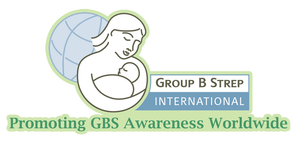I found out I was GBS+ after my midwife did the culture at 36 weeks and, although I was dismayed, I looked at the statistics and thought it was pretty unlikely to affect my baby anyway.
I was two days before my due date when I took my midwife's offer to strip my membranes. My mother was in town to watch my older daughter, and I wanted to go into labor soon to make the most out of her stay. I had no idea that this could cause a problem because of my GBS status.
I didn't go into labor that evening as I had hoped, but the next night I woke up with contractions and we decided to get ready to go to the hospital. My active labor was short - about 5 hours total. I got my IV shortly after getting to the hospital and not too long after that I felt the urge to push. I asked the midwife to check me and while she was examining me my water broke. It was stained with meconium and my midwife later said she had never seen such thick meconium surrounding a baby.
Not long after I began pushing the nurse leaned over and told me that the baby had to come out now. Her heart rate had dropped and wasn't coming back up. I began to push continually until she was born. They placed her on my chest for a moment before taking her to the NICU team to be evaluated for the meconium. She made one tiny cry, and then went limp.
Agnes pinked up right away and her Apgars were 8 and 9. My concern about the distress she showed during delivery quickly dissipated as she seemed fine and was nursing well.
Later in the day we found out that her CBC, which they had done as a precaution since I had received only one dose of antibiotics, showed an elevated white count. She developed a shrill cry and seemed to need to be pacified constantly. My pediatrician ordered another CBC, which also showed she was developing an infection.
The next morning my pediatrician came in to see the baby. They took Agnes to the nursery to be examined and then the pediatrician came to my room by herself. She told me that Agnes was starting to become sick, most likely with Group B Strep. (They said her blood culture didn't grow anything because I had received some antibiotics.) She said her cry and the way she reacted to being touched showed she was in pain. She told me that we we would need to treat her with 7 days of IV antibiotics (ampicillin and gentamicin) which they were starting immediately. Then she said, "I saved the worst for last -- she'll need to stay here the whole time."
I began to cry, but really because I was relieved. I knew how dangerous GBS was. I had spent lots of time online researching it since first finding out her white cell count was high, and if the worst of it was that we would need to stay in the hospital for seven days, then I knew we were incredibly fortunate.
My husband, who was away while the pediatrician came, returned to find me in tears. I had a hard time talking to tell him what had happened. A nurse came in and explained everything to him.
When I had composed myself, we walked down to the nursery to see Agnes. The nurses could see how sad I was as I watched her get her first dose of antibiotics through the window. They allowed us to come in and sit with her. I felt much better just being able to see her.
It was the most tense time of our lives while I waited to see how Agnes would respond to the treatment. We cancelled the visitors who were planning to come and see us and we slowly let everyone know that a damper had been placed on this joyful time.
The next day the pediatrician came and told us that she was pleased with her improvement and we breathed our first sigh of relief in 24 hours. Now we just had to stay the course. They had trouble keeping her IV open so she often had to have it reinserted, and for a while it was in her head. Her visits to the nursery for her antibiotics were often prolonged because of this, and I was sorry she had to suffer having the heplock reinserted over and over again.
We were thrilled when we were able to bring Agnes home. We still have one more hearing test to complete, to see if the antibiotics damaged her hearing, but nevertheless, we considered ourselves incredibly blessed when I think of the serious complications other families have faced. I will never know if having my membranes stripped caused her to be infected in the womb, but I know that with my next pregnancy, I will learn all that I can so that I won't have to rely on my provider's knowledge about GBS.
— Meredith Berry, WI, USA
Meredith tells other mothers their story by posting on message boards.
I was two days before my due date when I took my midwife's offer to strip my membranes. My mother was in town to watch my older daughter, and I wanted to go into labor soon to make the most out of her stay. I had no idea that this could cause a problem because of my GBS status.
I didn't go into labor that evening as I had hoped, but the next night I woke up with contractions and we decided to get ready to go to the hospital. My active labor was short - about 5 hours total. I got my IV shortly after getting to the hospital and not too long after that I felt the urge to push. I asked the midwife to check me and while she was examining me my water broke. It was stained with meconium and my midwife later said she had never seen such thick meconium surrounding a baby.
Not long after I began pushing the nurse leaned over and told me that the baby had to come out now. Her heart rate had dropped and wasn't coming back up. I began to push continually until she was born. They placed her on my chest for a moment before taking her to the NICU team to be evaluated for the meconium. She made one tiny cry, and then went limp.
Agnes pinked up right away and her Apgars were 8 and 9. My concern about the distress she showed during delivery quickly dissipated as she seemed fine and was nursing well.
Later in the day we found out that her CBC, which they had done as a precaution since I had received only one dose of antibiotics, showed an elevated white count. She developed a shrill cry and seemed to need to be pacified constantly. My pediatrician ordered another CBC, which also showed she was developing an infection.
The next morning my pediatrician came in to see the baby. They took Agnes to the nursery to be examined and then the pediatrician came to my room by herself. She told me that Agnes was starting to become sick, most likely with Group B Strep. (They said her blood culture didn't grow anything because I had received some antibiotics.) She said her cry and the way she reacted to being touched showed she was in pain. She told me that we we would need to treat her with 7 days of IV antibiotics (ampicillin and gentamicin) which they were starting immediately. Then she said, "I saved the worst for last -- she'll need to stay here the whole time."
I began to cry, but really because I was relieved. I knew how dangerous GBS was. I had spent lots of time online researching it since first finding out her white cell count was high, and if the worst of it was that we would need to stay in the hospital for seven days, then I knew we were incredibly fortunate.
My husband, who was away while the pediatrician came, returned to find me in tears. I had a hard time talking to tell him what had happened. A nurse came in and explained everything to him.
When I had composed myself, we walked down to the nursery to see Agnes. The nurses could see how sad I was as I watched her get her first dose of antibiotics through the window. They allowed us to come in and sit with her. I felt much better just being able to see her.
It was the most tense time of our lives while I waited to see how Agnes would respond to the treatment. We cancelled the visitors who were planning to come and see us and we slowly let everyone know that a damper had been placed on this joyful time.
The next day the pediatrician came and told us that she was pleased with her improvement and we breathed our first sigh of relief in 24 hours. Now we just had to stay the course. They had trouble keeping her IV open so she often had to have it reinserted, and for a while it was in her head. Her visits to the nursery for her antibiotics were often prolonged because of this, and I was sorry she had to suffer having the heplock reinserted over and over again.
We were thrilled when we were able to bring Agnes home. We still have one more hearing test to complete, to see if the antibiotics damaged her hearing, but nevertheless, we considered ourselves incredibly blessed when I think of the serious complications other families have faced. I will never know if having my membranes stripped caused her to be infected in the womb, but I know that with my next pregnancy, I will learn all that I can so that I won't have to rely on my provider's knowledge about GBS.
— Meredith Berry, WI, USA
Meredith tells other mothers their story by posting on message boards.
To learn more about Perinatal & GBS Misconceptions, click HERE.
To learn more about the Signs & Symptoms of Preterm Labor, click HERE.
To learn more about the Signs & Symptoms of GBS Infection, click HERE.
To learn more about Why Membranes Should NOT Be Stripped, click HERE.
To learn more about How to Help Protect Your Baby from Group B Strep (GBS), click HERE.
To learn more about the Signs & Symptoms of Preterm Labor, click HERE.
To learn more about the Signs & Symptoms of GBS Infection, click HERE.
To learn more about Why Membranes Should NOT Be Stripped, click HERE.
To learn more about How to Help Protect Your Baby from Group B Strep (GBS), click HERE.

